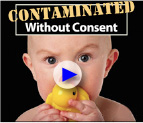Contact: Coming Clean, (802) 251-0203, info@comingcleaninc.org
January 15, 2010
FDA's BPA Announcement is an About Face on the Toxic Chemical
Environmental Health Groups Laud FDA's Concern about BPA, Call for Further Action
San Francisco, CA (January 15, 2010) – Scientists, physicians, consumers, and environmental health advocates responded with mixed emotions on Friday when the FDA made its announcement regarding the toxic chemical bisphenol A (BPA), a synthetic sex hormone linked to illness. The announcement had been expected November 30th, and advocates were hoping the delay meant a more thorough investigation into the health studies on BPA that had been ignored by the previous administration. Instead, FDA chose to concur with the National Toxicology Program's assessment of "some concern" from BPA for fetuses, infants and children, while acknowledging more research had come out in the year and a half since NTP's review. The Department of Health and Human Services announced a set of tips for parents to minimize their children's exposure to BPA. BPA is a synthetic sex hormone linked to cancer, behavioral changes, reproductive harm, heart problems, diabetes and other illnesses.
Congressmen Henry Waxman and Bart Stupak had formally asked for FDA to re-review their August 2008 assessment of BPA after its own scientific subcommittee ruled that it had ignored scores of valid studies showing BPA is harmful, and recommended that the agency reconsider its ruling that the chemical is safe for food-contact uses. Senator Dianne Feinstein, D-CA, and Rep. Edward Markey, D-MA, have introduced bills - S.593 and H.R. 1523 - to restrict BPA in food and beverage containers. Senator Charles Schumer, D-NY, and Rep. Anthony Weiner (D-NY) introduced bills - S. 753 and H.R. 4456 - that restricts BPA in select children’s products, recently citing Consumers Union's study of canned foods that revealed BPA in almost all of the 19 name-brand foods tested. EPA Administrator Lisa Jackson identified BPA as one of six chemicals requiring attention as legislative discussions continue about reforming the federal Toxic Substances Control Act.
Urvashi Rangan, PhD, toxicologist with Consumers Union, says BPA's use in food can linings needs to be addressed immediately. "Although food can linings is a relatively small use for BPA, it is a major source of exposure for most people and FDA needs to act as swiftly as possible to limit further exposure."
“It’s good that FDA finally registered concern about BPA and is advising parents to reduce children’s exposure,” said Janet Nudelman of the Breast Cancer Fund. “But the announcement today doesn’t go far enough to protect public health, and even sends a mixed message to consumers. Congress needs to step in and pass the bill currently under consideration, which would ban BPA from all food applications.”
Recent studies find BPA in the bodies of pregnant women and newborns. Bobbi Chase Wilding of Clean New York, pregnant with her second child says, "FDA's announcement increases the concern for pregnant and nursing women, yet fails to protect us or our children. By not taking definitive action, FDA and HHS today put the burden back on overtaxed parents to seek safer products, rather than removing BPA-laced ones from the marketplace which would protect all of us."
Mike Schade, Center for Health, Environment & Justice points out, "Retailers such as Walmart and manufacturers such as Nalgene are already responding to growing consumer awareness. FDA needs to protect U.S. businesses by making sure this toxic chemical is not allowed in the marketplace."
Accusations of industry influence on FDA decision-making on BPA plagued the agency in 2008.
Mia Davis, BPA Coordinator for Clean Water Action says, "Major baby bottle manufacturers and several retailers are already moving away from BPA, but it remains on store shelves in some bottles, sippy cups and in most canned goods. We are all exposed to BPA and other hormone disruptors from a myriad of sources, and our government agencies should be acting in our best interest to eliminate these exposures."
“Restrictions on BPA are in place in Connecticut, Minnesota, Chicago, three New York counties, and legislation has been introduced in 21 states,” according to Sarah Uhl from Coalition for a Safe and Healthy Connecticut.
Canada has declared BPA a toxic chemical, and US states and municipalities are taking action, including product bans and warnings to limit BPA exposures.
Oregon is currently looking at state legisaltion to restrict BPA. Renee Hackenmiller-Paradis, MPH, PhD, questions, “It has been a shame that the federal protections have been so minimal so as to force states to come up with real legislation to protect their citizens."
Kristen Welker-Hood, ScD, MSN, RN, director of Environment and Health Programs for Physicians for Social Responsibility says, “Systemic inflammation such as diabetes, cardiac illness, metabolic syndrome and other effects are on the rise and have been linked to BPA. It is great that FDA is moving forward, but how fast can they put protections in place?"
"The FDA's decision to recognize some concern about BPA and to fund research into safe alternatives for infant formula and other food contact surfaces is a step in the right direction to ensure safe access to food for all of God's children. But in a time of economic crisis when more people are dependent on lower-cost canned food which is often lined with BPA, the FDA needs to act swiftly to find safe alternatives for the market.” says Chloe Schwabe, Assistant Director for Environmental Health at the National Council of Churches.
Experts with direct contact info: http://www.louisvillecharter.org/press
Available for Interviews
- Sarah Janssen, MD, PhD, staff scientist at the Natural Resources Defense Council, 415-875-6126. Dr. Janssen can address health effects linked to BPA exposure and scientific integrity issues regarding BPA regulatory process.
- Mia Davis, former BPA Coordinator for Clean Water Action, Former Co-Coordinator, Workgroup for Safe Markets 617-338-8131, x201.
- Janet Nudelman, Director of Program and Policy at the Breast Cancer Fund. To schedule an interview, please contact Shannon Coughlin, 415-336-2246.
- Bobbi Chase Wilding, Organizing Director, Clean and Healthy New York, mom and National BPA Coordinator, Workgroup for Safe Markets, 518-708-3875.
- Mike Schade, Center for Health, Environment and Justice. 212-964-3680. Mike can address retailers pulling BPA products from their shelves and changes with manufacturers.
- Sarah Uhl, Coordinator, Coalition for a Safe & Healthy Connecticut, 860-232-6232. The Coalition worked to pass state legislation that is currently the most health protective policy on BPA in food and beverage containers worldwide.
- Richard A. Liroff, Ph.D., Executive Director, Investor Environmental Health Network, 703-532-2929. Rich can address the story of BPA manufacturer Sunoco refusing to sell its product to companies that make food products that might expose children to BPA.
- Naomi Starkman, Consumers Union, for report information: 917-539-3924.
- Renee Hackenmiller-Paradis, Program Director, Oregon Environmental Council 503-222-1963, x110. The state of Oregon is working on a BPA ban right now.
- Chloe Schwabe, Assistant Director for Environmental Health, National Council of Churches, 202-549-1696.
Resources
- It's best to avoid BPA, federal official says Chemical's effects a concern to head of health agency. Milwaukee Journal Sentinel, December 11, 2009
- Consumers Union Disappointed with FDA's Action on BPA, Despite Admission of "Some Concern." January 15, 2010
- FDA’s BPA announcement is too little, too late, Sarah Janssen, NRDC January 15, 2010
- Breast Cancer Fund Statement about Today's FDA Announcement Regarding BPA January 15, 2010
- Earliest Exposures, Toxic Chemicals in Pregnant Women. Washington Toxics Coalition, November 17, 2009 (includes BPA)
- Consumers Union Report on BPA in Food Containers. November 2, 2009
- Toxic Chemicals Found in Doctors and Nurses. October 8, 2009
- Physicians for Social Responsibility, Clean New York, American Nurses Association, Health Care Without Harm, Safer Chemicals, Healthy Families
- FDA relied heavily on BPA lobby Regulators actively reached out to industry. Milwaukee Journal Sentinel May 16, 2009
- Baby's Toxic Bottle Report (including BPA fact sheet). Center for Health, Environment and Justice
- Is It In Us? Biomonitoring study shows BPA contamination in the bodies of 35 people nationwide
- Chemical Offender: Bisphenol A Breast Cancer Fund
# # #




